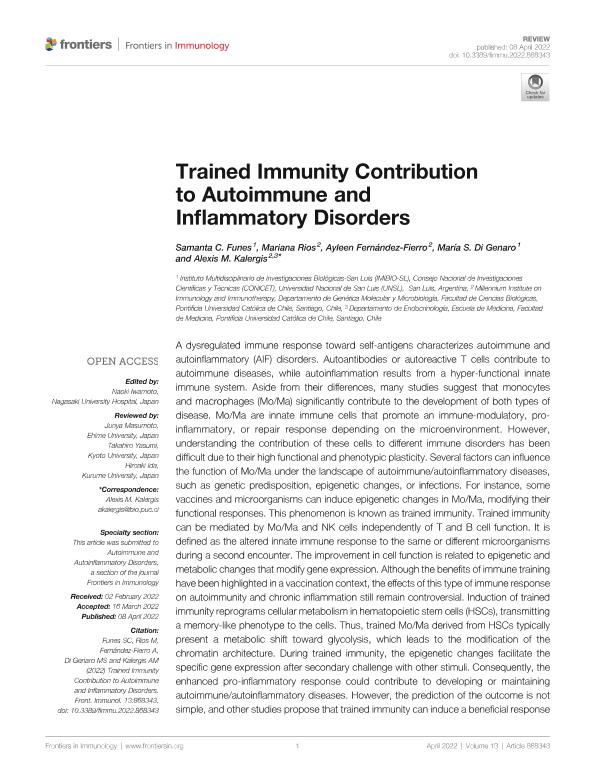Mostrar el registro sencillo del ítem
dc.contributor.author
Funes, Samanta Celeste

dc.contributor.author
Rios, Mariana
dc.contributor.author
Fernández Fierro, Ayleen
dc.contributor.author
Di Genaro, Maria Silvia

dc.contributor.author
Kalergis, Alexis M.
dc.date.available
2023-10-10T15:48:08Z
dc.date.issued
2022-04
dc.identifier.citation
Funes, Samanta Celeste; Rios, Mariana; Fernández Fierro, Ayleen; Di Genaro, Maria Silvia; Kalergis, Alexis M.; Trained Immunity Contribution to Autoimmune and Inflammatory Disorders; Frontiers Media; Frontiers in Immunology; 13; 4-2022; 1-15
dc.identifier.issn
1664-3224
dc.identifier.uri
http://hdl.handle.net/11336/214713
dc.description.abstract
A dysregulated immune response toward self-antigens characterizes autoimmune and autoinflammatory (AIF) disorders. Autoantibodies or autoreactive T cells contribute to autoimmune diseases, while autoinflammation results from a hyper-functional innate immune system. Aside from their differences, many studies suggest that monocytes and macrophages (Mo/Ma) significantly contribute to the development of both types of disease. Mo/Ma are innate immune cells that promote an immune-modulatory, pro-inflammatory, or repair response depending on the microenvironment. However, understanding the contribution of these cells to different immune disorders has been difficult due to their high functional and phenotypic plasticity. Several factors can influence the function of Mo/Ma under the landscape of autoimmune/autoinflammatory diseases, such as genetic predisposition, epigenetic changes, or infections. For instance, some vaccines and microorganisms can induce epigenetic changes in Mo/Ma, modifying their functional responses. This phenomenon is known as trained immunity. Trained immunity can be mediated by Mo/Ma and NK cells independently of T and B cell function. It is defined as the altered innate immune response to the same or different microorganisms during a second encounter. The improvement in cell function is related to epigenetic and metabolic changes that modify gene expression. Although the benefits of immune training have been highlighted in a vaccination context, the effects of this type of immune response on autoimmunity and chronic inflammation still remain controversial. Induction of trained immunity reprograms cellular metabolism in hematopoietic stem cells (HSCs), transmitting a memory-like phenotype to the cells. Thus, trained Mo/Ma derived from HSCs typically present a metabolic shift toward glycolysis, which leads to the modification of the chromatin architecture. During trained immunity, the epigenetic changes facilitate the specific gene expression after secondary challenge with other stimuli. Consequently, the enhanced pro-inflammatory response could contribute to developing or maintaining autoimmune/autoinflammatory diseases. However, the prediction of the outcome is not simple, and other studies propose that trained immunity can induce a beneficial response both in AIF and autoimmune conditions by inducing anti-inflammatory responses. This article describes the metabolic and epigenetic mechanisms involved in trained immunity that affect Mo/Ma, contraposing the controversial evidence on how it may impact autoimmune/autoinflammation conditions.
dc.format
application/pdf
dc.language.iso
eng
dc.publisher
Frontiers Media

dc.rights
info:eu-repo/semantics/openAccess
dc.rights.uri
https://creativecommons.org/licenses/by-nc-sa/2.5/ar/
dc.subject
AUTOIMMUNITY
dc.subject
AUTOINFLAMMATION
dc.subject
BCG (BACILLE CALMETTE-GUÉRIN)
dc.subject
TRAINED IMMUNE CELLS
dc.subject
TRAINED IMMUNITY
dc.subject
VACCINES
dc.subject.classification
Inmunología

dc.subject.classification
Medicina Básica

dc.subject.classification
CIENCIAS MÉDICAS Y DE LA SALUD

dc.title
Trained Immunity Contribution to Autoimmune and Inflammatory Disorders
dc.type
info:eu-repo/semantics/article
dc.type
info:ar-repo/semantics/artículo
dc.type
info:eu-repo/semantics/publishedVersion
dc.date.updated
2023-10-09T10:36:53Z
dc.journal.volume
13
dc.journal.pagination
1-15
dc.journal.pais
Suiza

dc.description.fil
Fil: Funes, Samanta Celeste. Consejo Nacional de Investigaciones Científicas y Técnicas. Centro Científico Tecnológico Conicet - San Luis. Instituto Multidisciplinario de Investigaciones Biológicas de San Luis. Universidad Nacional de San Luis. Facultad de Ciencias Físico Matemáticas y Naturales. Instituto Multidisciplinario de Investigaciones Biológicas de San Luis; Argentina
dc.description.fil
Fil: Rios, Mariana. Pontificia Universidad Católica de Chile; Chile
dc.description.fil
Fil: Fernández Fierro, Ayleen. Pontificia Universidad Católica de Chile; Chile
dc.description.fil
Fil: Di Genaro, Maria Silvia. Consejo Nacional de Investigaciones Científicas y Técnicas. Centro Científico Tecnológico Conicet - San Luis. Instituto Multidisciplinario de Investigaciones Biológicas de San Luis. Universidad Nacional de San Luis. Facultad de Ciencias Físico Matemáticas y Naturales. Instituto Multidisciplinario de Investigaciones Biológicas de San Luis; Argentina
dc.description.fil
Fil: Kalergis, Alexis M.. Pontificia Universidad Católica de Chile; Chile
dc.journal.title
Frontiers in Immunology
dc.relation.alternativeid
info:eu-repo/semantics/altIdentifier/url/https://www.frontiersin.org/articles/10.3389/fimmu.2022.868343/full
dc.relation.alternativeid
info:eu-repo/semantics/altIdentifier/doi/http://dx.doi.org/10.3389/fimmu.2022.868343
Archivos asociados
